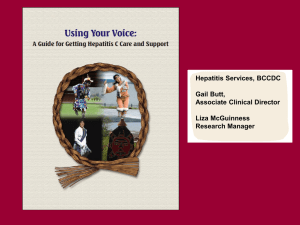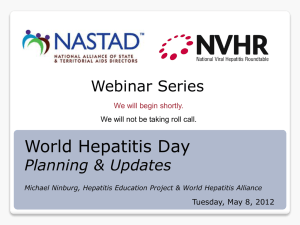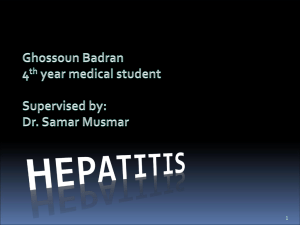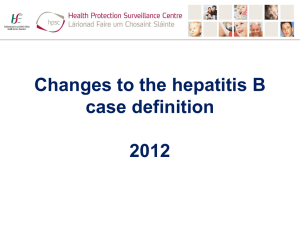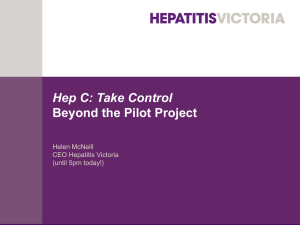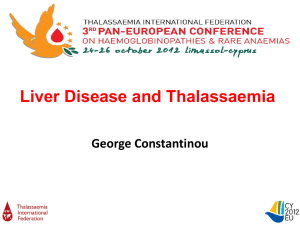Building Effective Advocacy for Hepatitis C
advertisement
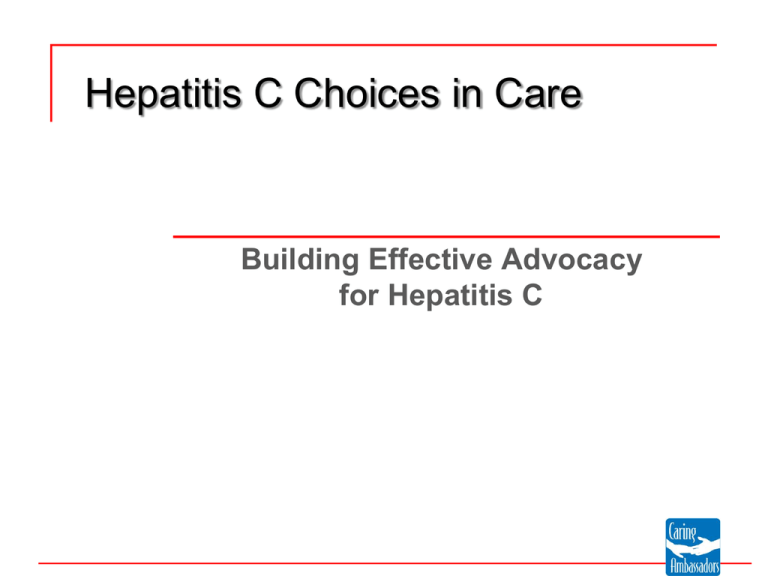
Hepatitis C Choices in Care Building Effective Advocacy for Hepatitis C What is an Advocate? 1 : one that pleads the cause of another; 2 : one that defends or maintains a cause or proposal There IS a Strengthening Advocacy Community National Viral Hepatitis Roundtable (NVHR) Hepatitis C Advocates UNITED! (HCAU) Hepatitis Appropriations Partnership (HAP) National Task Force on Hepatitis B HONOReform State and Local Hepatitis Advisory Committees—working with states, counties and cities…community activism is critical Political Landscape & Policy Challenges Health reform implementation Economy and Congressional priorities Whole new team of health leaders Hepatitis is underfunded—even a small increase would help significantly Many other programs are seeking increased funding Lack of chronic disease surveillance makes it difficult to demonstrate the burden of disease All politics are local Few Federal Dollars Available for Hepatitis Prevention Services 2% of the CDC’s National Center for HIV/AIDS, Viral Hepatitis, Sexually Transmitted Diseases and Tuberculosis Prevention budget is allocated to hepatitis B and hepatitis C. The overall budget of the National Center for HIV/AIDS, Viral Hepatitis, Sexually Transmitted Diseases, and Tuberculosis Prevention (NCHHSTP), where it is housed. The other disease prevention programs are funded as follows: HIV/AIDS 69%, STD 15%, TB 14%.CDC, Division of HIV/AIDS Prevention Health departments are able to use HIV prevention dollars, with the endorsement of their HIV CPG, to purchase hepatitis C testing services. There is no dedicated funding stream for adult vaccine. Federal Hepatitis Care & Treatment Programs There is no dedicated funding stream for care for HCV or HBV mono-infected persons. Community health centers and others need increased resources to help meet the needs of these complex patients. Provider training is critically needed. Persons co-infected with HIV and HBV/HCV are dependent on the already stretched Ryan White CARE Act system. CARE Act grantees are struggling to provide comprehensive services to their HIV infected clients. State ADAPs: 25 states provide HCV drugs on their formulary, 21 provide vaccine. Greater emphasis in addressing co-infection with HBV and HCV with current funding. Federal Hepatitis Care & Treatment Programs Veterans Health Administration National model for providing care and treatment to veterans with viral hepatitis. State Advocacy is So Important! With the lack of federal leadership and response - State efforts are vital Ability to secure state funding may be more likely Better access to policymakers Capitalize on the lack of federal response What Makes an Effective Advocate? Collaboration Education Message development Letter-writing / story-telling Persistence Collaboration Key Considerations in Planning What programs are already occurring? What seems to be the natural “next step”? Hepatitis coordinator is a vital resource. Who are your community allies? Who are your legislative champions? What is realistic to expect? Organize! Mobilize! Realize! Education - Learn the Facts With all that is happening in the world today, why should anyone care about hepatitis C? Hepatitis C is the most common chronic blood-borne virus in America. Message Development HCV Advocacy Messages Hepatitis C is everyone’s disease. No one is immune to hepatitis C. Message Development HCV Advocacy Messages The hepatitis C crisis requires: public awareness campaigns education for patients and providers prevention efforts HCV disease control Message Development HCV Advocacy Messages People with hepatitis C need and deserve: coordinated national, state, and local counseling, testing, and treatment programs consistent, sustained funding to control the hepatitis C epidemic and prevent further suffering Delivering Your Message Identify and stick to your islands! Delivering Your Message ACCESS TO CARE TESTING EDUCATION Delivering Your Message For example: Increased testing capacity 1 in 50 Americans have hepatitis C which is the most common chronic blood borne virus in the US however ~ 75% do not know it. ¾ of America’s health departments do not have the capacity to test for hepatitis C While everyone does not need interferon based treatment, everyone does need to know if they are infected to protect themselves and their loved ones. We are here today to ask that money be appropriated to increase the HCV testing capacity within the public health infrastructure to help alleviate the burden of this disease on individuals and on society. Letter-Writing / Story-Telling Never underestimate the power of your story! Persistence Top 10 Advocacy Activities Be Informed! Communicate with Policymakers! Vote! You’re the Experts! Share Your Expertise! Hepatitis Policy Updates Share with Partners Coalitions – Local, State & National Join and Share Your Perspective Work with Other Advocates Advocates, CBO’s and Health Departments Join Local/State Hepatitis Task Forces Encourage Advocacy/Policy Subcommittees Top 10 Advocacy Activities Seek Gubernatorial and Mayoral Proclamations Utilize Awareness Days Engage with the Media Press Releases, Letters to the Editor, Features Articles, Editorial Review Boards State of Hepatitis Forums Hepatitis, HIV, Immunization, Substance Use, etc. – Invite Policymakers - Highlight the Need Hepatitis Advocacy/Lobby Day Descend on the State Capitol Together We Can Make a Difference A small group of thoughtful people could change the world. Indeed, it's the only thing that ever has. ~ Margaret Mead For more information Chapter 24: A Look to the Future http://www.hepcchallenge.org/choic es/pdf/Chapter_24_OL.pdf Visit us on line at www.HepCChallenge.org
